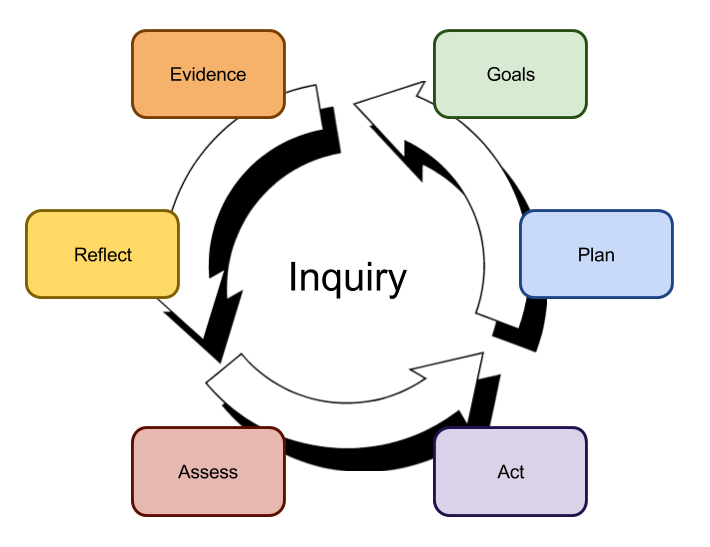tl;dr: Strategic inquiry is a lesson study structure.
One of my roles in my current job is to help facilitate team meetings for two schools. In these team meetings, our objective is to collaboratively study our individual impact on student learning, and work together to design instructional strategies for improving the learning outcomes of students.

This means we collaboratively:
- Look at student work.
- Take the time to notice things about the student work that everyone agrees on.
- Ask more inferential questions about the student work.
- Identify a specific area that we should focus on for this student.
- Offer suggestions as to what we would do if we were the teacher for this student.
- Make a plan that includes a plan to re-assess students.
- With the assessment information from our plan, if necessary, revisit steps 1 to 6.
Teachers definitely need to collaborate in this process. The most important reason to collaborate with other teachers when studying the impact of your own teaching; other teachers can offer insight and feedback that you cannot see yourself. Also, when you first start looking carefully at the impact of your teaching, it can also be disheartening sometimes to see how little impact you sometimes and having some colleagues to reflect on this and offer support is invaluable.
There is evidence to suggest that teachers improve faster when they work together to plan and reflect on their teaching. Two central tenets of John Hattie’s book, Visible Learning for Teachers (2012), are that teachers should know their impact, and work together to improve each other’s teaching. A highly effective model, Hattie suggests, is for teams of teachers to norm around what it means to be successful in their subject area, look at sources of student data, and collaboratively create instructional plans to attend to trends in that student data. In Ilana Horn’s summary of her research into professional learning of math teachers, she suggests that teachers learn most about teaching when their conversations are centred around teaching, students, and mathematics.
I have a proposal. I would like to form and facilitate an inquiry group of 3 or 4 other people from the online mathematics community. We would start the inquiry process for next September.
Here’s what would make your participation ideal:
- You are interested in studying your impact as a teacher,
- You have enough time to meet once a week (or once every two weeks) for about an hour or 90 minutes,
- You are teaching a course which is substantially similar to everyone else that participates (or alternatively, happy to help someone study their teaching in a course you are not teaching),
- You are able to give your students a pre-assessment before you start teaching, and the same post-assessment after you teach a unit,
- Have the technical know-how to upload your student work, minus personal identifying features, into a shareable space,
- And are able to participate using our chosen communication technology (Google+ Hangout or BigMarker are my two suggestions for now).
Here are two other ideas to make our work even MORE ideal:
- All participants are teaching the same course using roughly the same scope and sequence. For example, we could all teach the Common Core aligned Integrated Algebra 1 using the Mathematics Design Collaborative scope and sequence.
- All participants use the same pre-assessments and the same post-assessments (but are obviously free to sequence and teach the unit topics as they see fit).
Benefits:
- Your teaching will improve (probably),
- Your students will likely benefit,
- You will have a source of other people teaching roughly the same content at roughly the same time, which will make collaboration around resources and lesson planning much easier.
If you are interested in participating, fill out this form here: http://wees.it/inquiry.